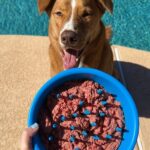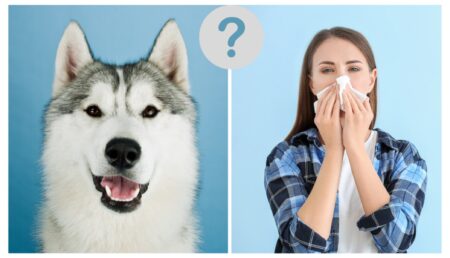
Are Huskies Hypoallergenic? We Have The Answer
Whether you’re a pet lover or simply curious about these beautiful creatures, you might have wondered if huskies are hypoallergenic. After all, who wouldn’t want to cuddle with a fluffy, blue-eyed bundle of fur?
So, before you rush out to adopt a husky it’s important to understand the facts about these dogs and their potential impact on people with allergies. Huskies are known for their thick double coats, which can shed quite a bit, triggering allergies in some individuals. Let us dig in more!
Are Huskies Hypoallergenic? We Have The Answer
The short answer is that huskies are not considered hypoallergenic dogs. But what exactly does Hypoallergenic mean?
Hypoallergenic means that something causes a reduced allergic response. In the case of pets, this generally refers to a lower likelihood of triggering allergic reactions in people. This can be due to factors like the type and amount of dander and saliva produced, or how much a pet sheds.
So, undeniably adorable Huskies are not known for being hypoallergenic dogs.
What is A Dog Allergy?
A dog allergy is a reaction to allergens produced by dogs, such as dander (shed skin cells), saliva, and urine and these allergens can cause sneezing, runny nose, itchy eyes, and other symptoms in people who are sensitive to them.
Dog allergies can vary in severity and may affect people differently. Some individuals may be mildly affected by dander while others may have more severe reactions, such as asthma or hives.
Do Huskies Have A Lot of Allergies?
Huskies are not known to have a higher prevalence of allergies than other dog breeds. However, they are known to be heavy shedders, which can trigger allergies in people who are sensitive to pet dander.
Huskies are also prone to certain health conditions, such as hip dysplasia, eye problems, and digestive issues, but these are not related to allergies. If you are considering adopting a husky, it is important to research the breed and be aware of any potential health concerns.
Is Husky Good for First-time Owners?
Well, while huskies are beautiful and loving companions, they may not be the best choice for first-time dog owners because these dogs have high energy levels which require a lot of exercise and attention and they also have a strong prey drive, which can make them difficult to train.
Huskies are also known for being very independent and stubborn, which can make them challenging for inexperienced owners. If you are a first-time owner, consider adopting a more low-maintenance breed that is easier to train and handle.
Some Common Husky Allergies Symptoms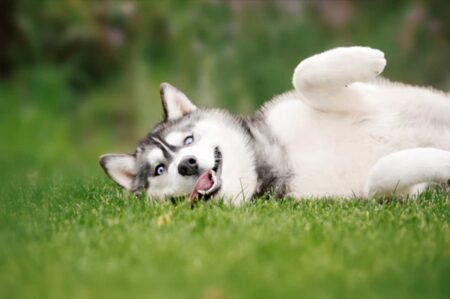
Here are some common symptoms that may indicate your husky is experiencing allergies:
- Excessive scratching or licking:
Allergies can cause itchiness and discomfort, leading your husky to scratch or lick themselves excessively.
- Watery, red, or itchy eyes:
Allergies can also affect your husky’s eyes, causing redness, itchiness, or wateriness.
- Runny nose:
A runny nose is a common symptom of allergies in huskies. This is caused by the body’s immune system overreacting to allergens, such as pollen or dust, which triggers the production of mucus.
- Sneezing:
If your husky is sneezing more frequently than usual, it could be a sign of allergies.
- Skin irritation:
Huskies with allergies may experience skin irritation, such as redness, inflammation, or hot spots.
- Ear infections:
Ear infections are a common symptom of allergies in huskies. When the ear canal becomes inflamed, it can lead to a buildup of bacteria or yeast, which can cause irritation and discomfort.
- Excessive paw licking or chewing:
If your husky is licking or chewing their paws more than usual, it could be a sign of allergies.
- Diarrhea or vomiting:
Allergies can also cause gastrointestinal issues, such as diarrhea or vomiting.
- Hair loss or thinning coat:
Hair loss or a thinning coat is another symptom that may indicate allergies in huskies. This is caused by the irritation and inflammation of the skin, which can lead to hair loss and thinning of the coat.
What Determines If A Dog is Hypoallergenic?
The term “hypoallergenic” is often used to describe dogs that produce fewer allergens, such as dander and saliva, which are the primary causes of allergic reactions in people.
However, the truth is that no dog breed is completely hypoallergenic. All dogs shed and produce dander and saliva to some extent, which means that there is always a risk of allergic reactions for people who are sensitive to these allergens.
That being said, certain dog breeds are considered more hypoallergenic than others because they tend to shed less or produce less dander.
Some Common Hypoallergenic Dogs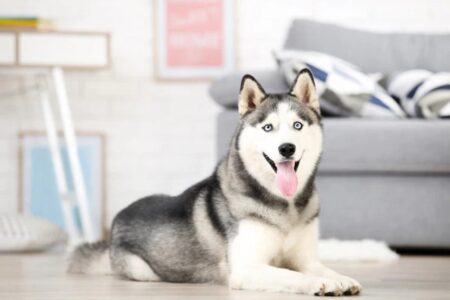
Here are some common hypoallergenic dog breeds:
- Poodle: Poodles are one of the most popular hypoallergenic breeds due to their low shedding and dander production. They come in a variety of sizes and colors, making them a versatile choice.
- Bichon Frise: Bichon Frises have a soft, curly coat that sheds minimally, making them an excellent choice for people with allergies.
- Maltese: Maltese dogs have a long, silky coat that is considered hypoallergenic because it sheds very little.
- Schnauzer: Schnauzers have wiry coats that shed minimally, making them a good choice for people with allergies. There are three types of Schnauzers: miniature, standard, and giant.
- Portuguese Water Dog: These dogs have a curly coat that is similar to a Poodle’s, which means they shed minimally and produce less dander.
- Labradoodle: Labradoodles are a hybrid breed created by crossing a Labrador Retriever with a Poodle.
- Shih Tzu: Shih Tzus are another small breed that is considered hypoallergenic because of their long, silky coat that sheds very little. They are affectionate and playful dogs that make great companions.
- Yorkshire Terrier: Yorkies are small, feisty dogs that are considered hypoallergenic due to their fine, silky coat that does not shed much.
Hypoallergenic Husky Poodle Mix
A hypoallergenic Husky Poodle mix, often referred to as a “Siberpoo” or a “Huskipoo,” is a hybrid breed created by crossing a Husky with a Poodle.
Because the Poodle parent is hypoallergenic, the Husky Poodle mix may inherit this trait and produce less dander and shedding. However, it’s important to remember that genetics are unpredictable, and it’s not guaranteed that the Husky Poodle mix will be hypoallergenic.
How Do I Find The Right Puppy for Me If I Have Dog Allergies?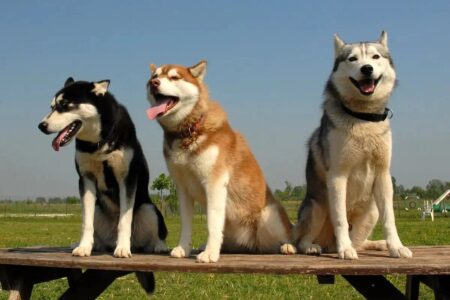
Finding the right puppy for you can be challenging if you have dog allergies. Here are some steps you can take to increase your chances of finding a hypoallergenic puppy:
- Research hypoallergenic dog breeds: As mentioned earlier, certain breeds are considered more hypoallergenic than others. Consider breeds like Poodles, Bichon Frises, or Schnauzers.
- Look for breeders that specialize in hypoallergenic dogs: Many breeders specifically breed hypoallergenic dogs, which can be a great resource for finding a puppy.
- Meet the puppy in person: If you’re interested in a particular puppy, arrange to meet them in person. Spend some time with the puppy to see if you have an allergic reaction.
- Consider adopting a mixed breed: Many mixed-breed dogs inherit hypoallergenic traits from their parents. You can search for hypoallergenic mixed breeds at local shelters or rescue organizations.
- Consider a non-shedding breed: Some breeds, such as the Bichon Frise, are considered non-shedding.
A Conclusion About Being An Asthma Sufferer and Owning a Siberian Husky
For asthma sufferers, owning a Siberian Husky can pose some challenges, as they are not hypoallergenic and tend to shed quite a bit. However, with proper care and management, it may be possible for people with asthma to live with a husky.
It’s important to keep in mind that every person’s asthma is different, and the severity of symptoms can vary widely. So, if you have asthma and are considering adopting a Siberian Husky, consult with your doctor to determine if it’s a safe choice for you.
FAQs:
Q. What dog is 100% hypoallergenic?
In truth, no dog is 100% hypoallergenic. While certain breeds may be considered more hypoallergenic due to their low shedding or low dander production, no breed is completely allergen-free.
Q. Can I be allergic to Husky hair?
Yes, you can be allergic to Husky hair, as well as other dog hair and dander, if you have an allergy to pet allergens. Even hypoallergenic breeds can cause allergies in some people, as the allergens can be present in the skin, saliva, and urine of all dogs.
Q. Are Siberian Huskies hypoallergenic?
No, Siberian Huskies are not considered hypoallergenic, as they shed and produce dander, which can trigger allergies in some people. If you are sensitive to pet allergens, consider adopting a different breed or a mixed breed that is less likely to cause allergic reactions.
Q. How do I know if I’m allergic to my Husky?
You can tell if you are allergic to your Husky if you experience symptoms such as sneezing, runny nose, itchy eyes, coughing, or skin irritation when you come into contact with your dog.

